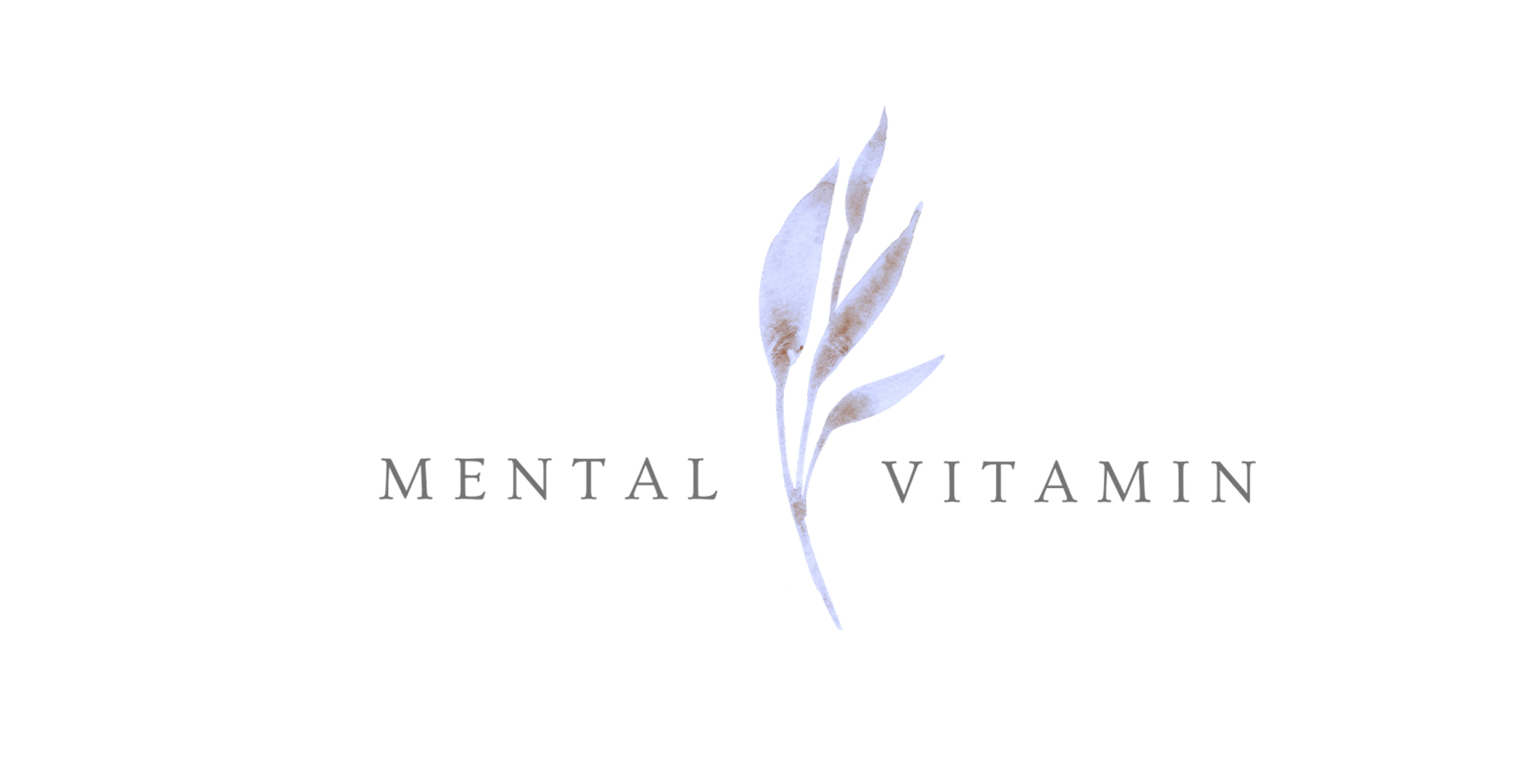Just a friendly heads-up! The information shared in this post is for general knowledge purposes only and should not be considered a substitute for professional medical advice. It’s crucial to talk to a healthcare professional before trying any new supplements. They can provide personalized guidance based on your unique needs and ensure they are safe for you. Remember, your health comes first, so consult with a qualified healthcare provider for the best advice tailored to you.
Table of Contents
This article may contain compensated links. Please read Disclaimer for more info. As an Amazon Associate, I earn from qualifying purchases.
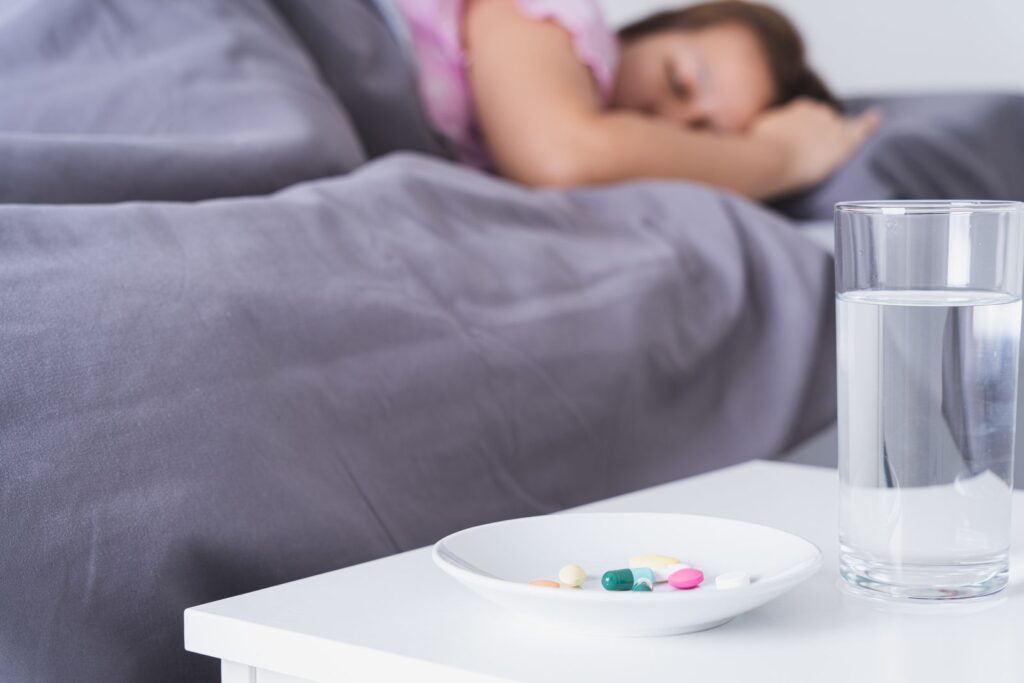
You’re lying awake in the darkness, yearning for the sweet solace of a peaceful night’s sleep.
A frustrating experience, leaving you drained and longing for restorative rest that you so desperately need. Your strenuous job, your teenage children, and your elderly mom needing care.
Yet night after night, you find yourself tangled in the restless embrace of insomnia. The hours slip away as your mind races relentlessly.
As a resilient and driven individual, you’ve turned to herbs and vitamins, seeking their promise of well-being.
But what if these trusted supplements cause insomnia, unknowingly jeopardizing your precious sleep?
It’s a startling realization.
Let’s delve into the depths of this mystery, unraveling the mysteries of these sleep disruptors, and uncovering the path to reclaiming your restful sleep.

Insomnia Triggers: Detour in the Quest for Revitalization
Insomnia has many triggers. From stress to changes in your sleep environment, these varied causes of insomnia can make a good night’s sleep feel like a complex puzzle.
But did you know that “healthy” foods like dark chocolate or green tea and those well-intentioned herbs and supplements like guarana and multivitamins might just be sneaky troublemakers?
Picture this: Your energy levels are dwindling, and your focus is dissipating due to inadequate sleep. In response, you choose to embrace a health-conscious lifestyle, welcoming these so-called “miracle” products into your daily routine, hoping for revitalization.
But instead of dozing off peacefully, things take an unexpected detour.
It’s bewildering indeed.
Insomnia is a fairly common sleep disorder, affecting between 10–30% of adults. It’s characterized by difficulty falling asleep, staying asleep, or waking up too early and not being able to get back to sleep.
Interestingly, research shows that in 2017–2018, about 57.6% of adults in the United States used dietary supplements regularly. The most common ones were multivitamins and minerals.
There’s some evidence suggesting that not getting enough nutrients, like vitamins A, C, D, E, and K, as well as calcium and magnesium, might be linked to sleep problems. But on the flip side, taking supplements or certain vitamins could also lead to sleep disturbances.
Let’s have a closer look at these seemingly innocent substances and unravel the secrets they might be hiding: What vitamins cause trouble staying asleep? Which ones are the culprits for falling asleep? Which ones will improve sleep quality?
You’ll see, we’ll have you snoozing soundly in no time.
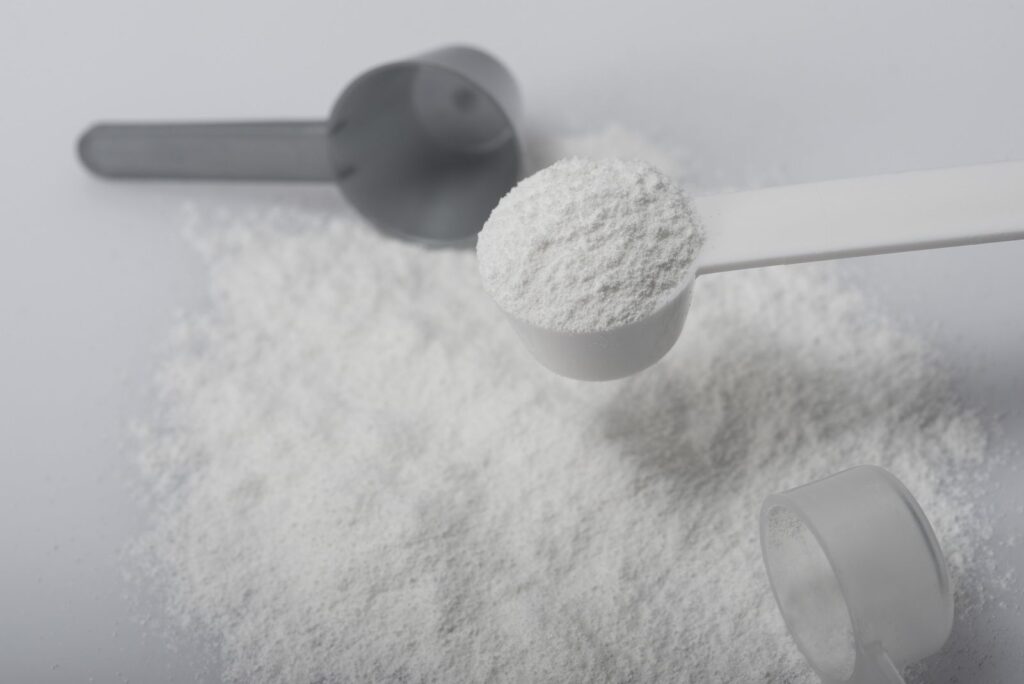


Supplements and Insomnia: The Good, the Bad, and the Conflicting
Figuring out how vitamins, minerals, and other micronutrients relate to sleep is like piecing together a scattered mosaic of scientific research. Addressing the pivotal question, “Can vitamins cause insomnia?” isn’t as straightforward as one might think.
In terms of supplements and insomnia, there is only limited research available.
However, that doesn’t mean we’re left in the dark. It’s all about understanding our own biochemistry and how supplements can impact our sleep in unique ways.
Let’s find out what supplements can cause insomnia, looking at the helpful, the harmful, and the downright confusing parts.
Vitamin D: A Balancing Act for Sleep
When wondering, “Can supplements cause insomnia?”, the first vitamin that comes to mind is vitamin D.
Having sufficient vitamin D levels is crucial for overall health. It helps regulate important bodily functions and supports the production of serotonin, the neurotransmitter that influences sleep and mood.
So, getting your daily dose of Vitamin D is vital to keeping your sleep game strong.
But what about vitamin D and insomnia? Here’s the twist: Taking vitamin D supplements at the wrong time or in the wrong dosage can be a severe sleep disruptor.
If you’re struggling with sleeplessness and you take high dosages at night, vitamin D insomnia could be the culprit. It’s as if your body interprets the abundance of vitamin D as sunlight, leading to reduced melatonin production.
What is further important to know is that vitamin D is fat-soluble, meaning it’s better absorbed when combined with fatty foods. So, it’s recommended to take it with a full meal. But avoid consuming it in the evening.
Ideally, before you start supplementing, get your vitamin D levels checked by a trusted health professional. They can determine if it makes sense to supplement and at what dosage.
Excessive intake of vitamin D, usually through high-dose dietary supplements, can further lead to a condition called hypervitaminosis D. This can cause a range of issues, including kidney stones and hypercalcemia, where there is an excess of calcium in the bloodstream.
Hypervitaminosis D is comparatively rare, but still important to be aware of.
Symptoms of an overdose may include sleep disorders, nausea, vomiting, loss of appetite, headaches, nervousness, extreme thirst, frequent urination, and even kidney damage.
If in doubt, make sure to consult with a healthcare professional to determine the appropriate vitamin D intake for your specific needs.
Remember, balance and timing are key. Stick to your doc’s advice to avoid vitamin D insomnia.
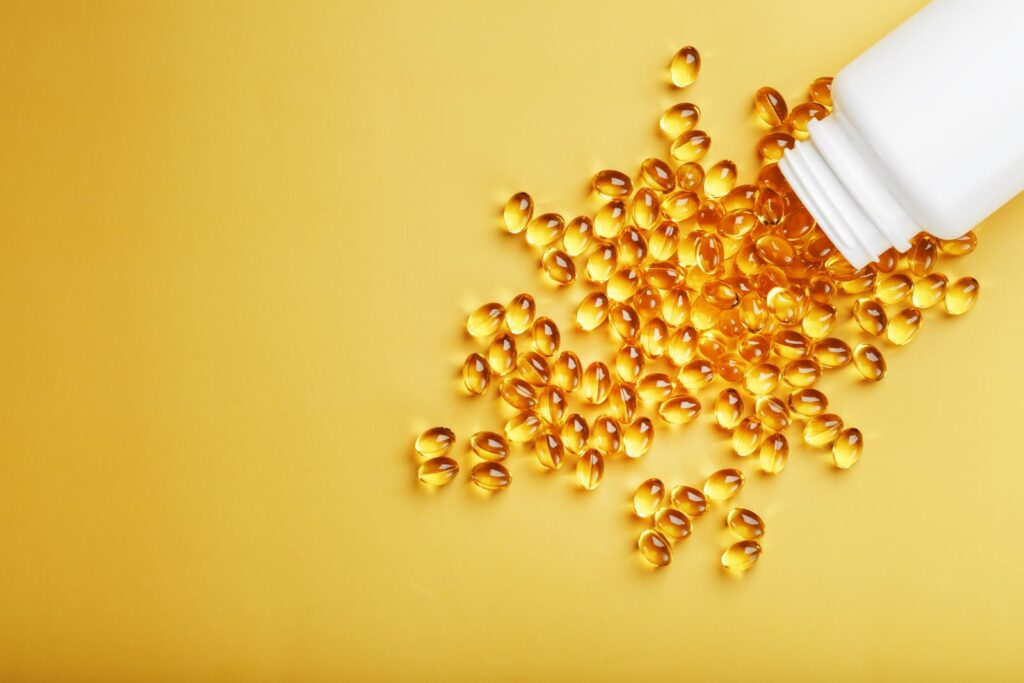
B Vitamins: Energizing Days, Sleep Trouble Nights?
B vitamins play a crucial role in both physical and mental health. Involved in various bodily functions such as energy production, metabolism, and nerve signaling, they’re indispensable for good sleep.
Let’s have a look in a nutshell at how B vitamins can fight a sleep disorder:
- Vitamin B6 promotes serotonin and dopamine production, which are crucial for mood and a restful slumber.
- Vitamin B12 supports brain health, nerve function, heart health, and digestive health.
- Folate ensures balanced serotonin and melatonin levels, fighting fatigue and promoting quality sleep.
- Vitamin B3 aids brain function, energy metabolism, and neurotransmitter synthesis.
- Vitamin B5 boosts acetylcholine for a regulated sleep-wake cycle.
- Vitamin B2 converts tryptophan into serotonin, enhancing sleep quality.
Therefore, embracing the power of these precious B vitamin supplements is key to boosting physical energy, enhancing mood, and improving sleep.
But back to the question: Can B vitamins cause insomnia?
Again, timing and dosage are key.
Taking B vitamins too close to bedtime can increase energy levels and contribute to sleep issues or restlessness. For example, vitamin B6 should ideally be taken earlier in the day to support serotonin and dopamine production, allowing for a more restful slumber.
Research on B12 for sleep shows conflicting findings.
Many studies focus on the connection between B12, sleep patterns, and overall well-being. The findings indicate that higher amounts of the vitamin may be associated with shorter sleep durations and a higher risk of insomnia.
What is more, there is evidence suggesting that vitamin B12 can impact the 24-hour biological processes involved in transitioning from wakefulness to sleep.
Interestingly, combining vitamin B complex with magnesium and melatonin has shown promising results in sleep regulation and improving insomnia. This combination may help enhance sleep quality and promote better sleep regulation.
Finally, it is critical to pay attention to your individual response to vitamin B supplementation and how far it can support your sleep habits.

DHEA: Anti-Aging with a Twist
DHEA, short for dehydroepiandrosterone, is a hormone naturally produced by the adrenal glands.
For good reason, DHEA is often touted as a potential anti-aging aid. Some studies suggest that DHEA supplementation may support muscle strength and body composition, improve mood, enhance libido, and increase overall vitality.
DHEA levels naturally decline as we age, beginning around our twenties and becoming significantly lower as we get older. Because DHEA deficiency may contribute to increased sleep apnea in the elderly, taking it as a supplement can be extremely beneficial.
However, it’s worth noting that more research is needed to fully understand these effects.
What’s more, taking the hormone doesn’t come without risks. DHEA can mess with your body’s hormone balance, and that can cause some unwanted side effects. Especially women have reported increased cases of acne and oily skin, hair loss, and even changes in their menstrual cycle.
DHEA can also disturb the delicate balance of your sleep. Like a double-edged sword, its stimulating effects may interfere with the tranquility of your slumber.
Varying hormone levels affect your sleep-wake cycle. Melatonin, the sleep hormone, is high at night, promoting rest, while DHEA, responsible for alertness, is high during waking hours.
During sleep, melatonin is at its peak, leading to non-rapid eye movement (NREM) sleep with low DHEA levels, promoting a calm state.
Sleep disturbances can occur if DHEA levels are not adequately low, such as in sleep apnea, leading to disrupted sleep regulation and awakenings.
To optimize your sleep while taking DHEA supplements, it’s generally recommended to take them in the morning. Your body makes DHEA primarily in the morning, so taking it early in the day will mimic this natural rhythm.
However, individual responses to DHEA may vary, so paying attention to your body’s reaction and consulting with a healthcare professional can help determine the best timing for you.
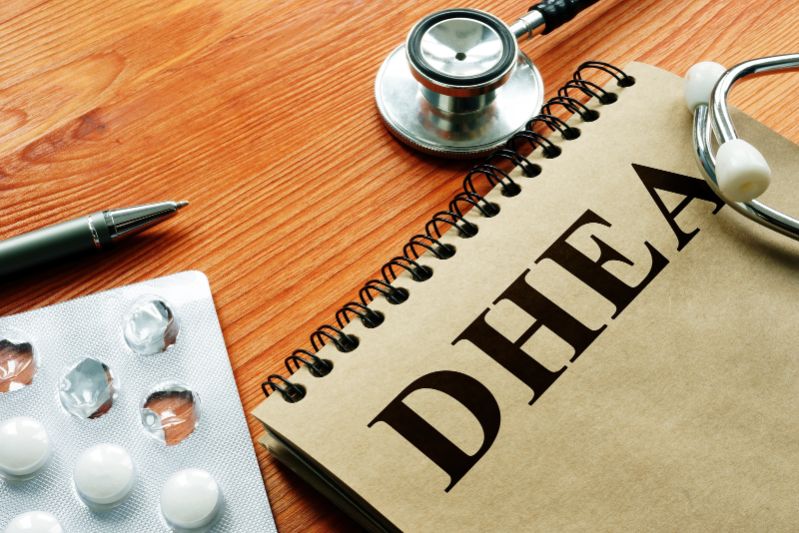
Weight-Loss Supplements: Perfect Shape, Awful Rest
Weight-loss supplements have become increasingly popular as people strive to shed those extra pounds and achieve their fitness goals.
These supplements often promise a boost in metabolism, increased fat burning, and enhanced energy levels. While they can offer some advantages in the weight loss journey, it’s crucial to be aware of the downsides.
Potential drawbacks include a lack of regulation by the Food and Drug Administration in the United States, some severe side effects, interactions with medications, dependency risks, and inadequate long-term evidence.
The potential impact on sleep patterns is often overlooked, making them important factors to consider when discussing insomnia vitamins.
While they can rev up your metabolism and provide an energy boost during the day, they may wreak havoc on your sleep schedule if consumed too close to bedtime.
Picture this: You’re all fired up from your workout, chugging that fat-burning elixir, and suddenly find yourself wide awake when you should be getting that much-needed rest.
If you’re sensitive to stimulants or already prone to sleep disturbances, consider avoiding them in the evening or opt for stimulant-free alternatives with fewer side effects.
Bear in mind, a solid night’s rest is critical for your overall health and well-being. Trading it in merely to lose a couple of pounds may not be the most beneficial exchange.
Furthermore, recent research underscores how high-quality sleep can actually become a valuable ally in your weight loss journey.
Make sure to monitor your intake of weight-loss vitamins, insomnia triggers, and physical activity.

Guarana: Don’t do Bean Counting at Night
Guarana is an astounding energy powerhouse derived from the Amazon rainforest.
It is commonly found in soft drinks and supplements and offers several benefits supported by scientific research.
Its antioxidant content, which includes caffeine, theobromine, tannins, saponins, and catechins, neutralizes harmful molecules known as free radicals. This may reduce the risk of heart disease and cancer.
Another of the well-known benefits of Guarana is its ability to reduce fatigue and improve focus. Even more so after a night of sleep deprivation. The caffeine in guarana blocks the effects of adenosine, a compound that promotes relaxation, thereby enhancing mental energy and concentration.
But yes. You’ve guessed it. This stimulant effect can be a double-edged sword, especially when it comes to sleep.
Imagine popping a Guarana supplement, and suddenly you find yourself lying awake at night counting beans. It might also reduce the overall quality of sleep, leading to fragmented and restless nights.
Excessive consumption of Guarana can further lead to a cycle of dependency, where you may need increasing amounts to achieve the same level of alertness. This makes it harder to cut back on your intake, and your sleep will likely get worse.
To savor the benefits of Guarana without sacrificing your sleep, be mindful of your usage, especially as the sun starts to set. Keep your intake in check, and you’ll enjoy the perks of Guarana during the day without losing sleep over it.

@El Español
Green Tea Extract: The Right Timing for Antioxidants
Green tea extract is essentially a supercharged version of green tea that is packed with antioxidants. These antioxidants, especially epigallocatechin gallate (EGCG), have numerous health benefits.
The extract is known for its protective effects on the heart, brain, and liver. By reducing inflammation, managing blood pressure, and controlling blood fats, it supports heart health.
Additionally, its antioxidants shield brain cells, potentially lowering the risk of cognitive decline.
If you’re focusing on weight loss, green tea extract might aid in boosting your metabolism. The blend of catechins and caffeine present can enhance the rate at which your body burns calories.
Furthermore, studies suggest it improves post-workout recovery and reduces signs of muscle damage from intense exercise.
However, there’s a caveat: a high intake of green tea extract disrupts sleep for some individuals. The potent concentration of catechins can interfere with sleep patterns, potentially causing restlessness.
While the caffeine in green tea is less than in coffee, it’s enough to potentially cause restlessness or sleep disturbance in some people, especially if consumed close to bedtime.
If you are caffeine sensitive, it is best to avoid green tea extract later in the day to ensure a restful night’s sleep.

Cacao Supplements: Blissful Delight Gone Wrong?
The debate around the idea of enjoying a cup of cocoa or taking cacao supplements before bed is intriguing.
Let’s clear up the difference quickly:
Cacao refers to the raw, minimally processed form of chocolate that retains a higher concentration of beneficial compounds such as antioxidants, minerals, and flavonoids.
Cocoa, contrastingly, is a processed variant of cacao with reduced nutritional value. The process involves roasting and grinding the beans into a powder.
For reaping the maximum health advantages, cacao supplements typically outshine cocoa. You can enjoy cacao in various forms: as a warm beverage when it’s powdered, or as nibs and pills.
Cacao does more than just delight your taste buds; it’s loaded with active compounds and nutrients that can boost brain activity, influencing your mood and mental health.
When you consume cacao, it triggers the release of endorphins, serotonin, and dopamine, our body’s natural feel-good hormones. Endorphins act like natural painkillers, generating feelings of happiness and euphoria. Serotonin brings emotional balance, while dopamine is linked to pleasure and reward.
Cacao contains compounds like anandamide that could help prevent mental health issues like anxiety and depression. Including cacao in your diet might even encourage the creation of new brain pathways.
Relaxing with a hot drink before bed can help soothe your mind, setting you up for a good night’s sleep. Plus, cacao is full of antioxidants with anti-inflammatory properties, which could promote relaxation.
But it isn’t a dream come true for everyone.
It also contains caffeine and theobromine, which can perk you up if you’re sensitive. So tune into your body’s responses and decide if cacao before bed works for you.

Red Yeast Rice: Cholesterol’s Nemesis, Sleep’s Foe
Red Yeast Rice has taken center stage in the wellness world for its ability to keep cholesterol levels in check.
Its secret weapon?
Monacolin K, a compound that mirrors the active ingredient in some statins.
This statin-like component works by inhibiting a key enzyme in the liver that is responsible for cholesterol production. This interruption in the production process can help manage high cholesterol levels, making red yeast rice a potential ally for heart health.
However, just as statins are known to impact your sleep time, monacolin K in red yeast rice can do the same.
What’s more, the strength of monacolin K in red yeast rice isn’t one-size-fits-all. It varies from product to product, ranging from non-existent to high levels. Some red yeast rice also contains citrinin which can be harmful to your kidneys.
Before opting for red yeast rice, consult a healthcare professional, especially if you’re on other medications.
Coenzyme Q10: Don’t Do Nighttime Energy Boosting
Coenzyme Q10, often called CoQ10, is a compound naturally produced in your body.
It’s an energy booster for your cells and acts as a powerful antioxidant. CoQ10 has shown promise for handling a bunch of conditions like neurological aging, heart disease, diabetes, and even migraines.
But just like anything else, CoQ10 can come with a few potential side effects.
You might encounter heartburn, diarrhea, or acid reflux. There are also less common effects like light sensitivity, headaches, and even irritability.
So, does CoQ10 cause insomnia as well?
Some people report experiencing insomnia when taking CoQ10 before bed. If you’re already on certain medications like blood thinners, antidepressants, or chemotherapy drugs, your risk could be higher.
Research sheds light on why CoQ10 might interfere with sleep. As an energy booster at the cellular level, CoQ10 can heighten metabolic activity and brain function. This elevated state can make it challenging to wind down.
It’s usually a good idea to take CoQ10 it in the morning or afternoon to keep your sleep schedule on track.
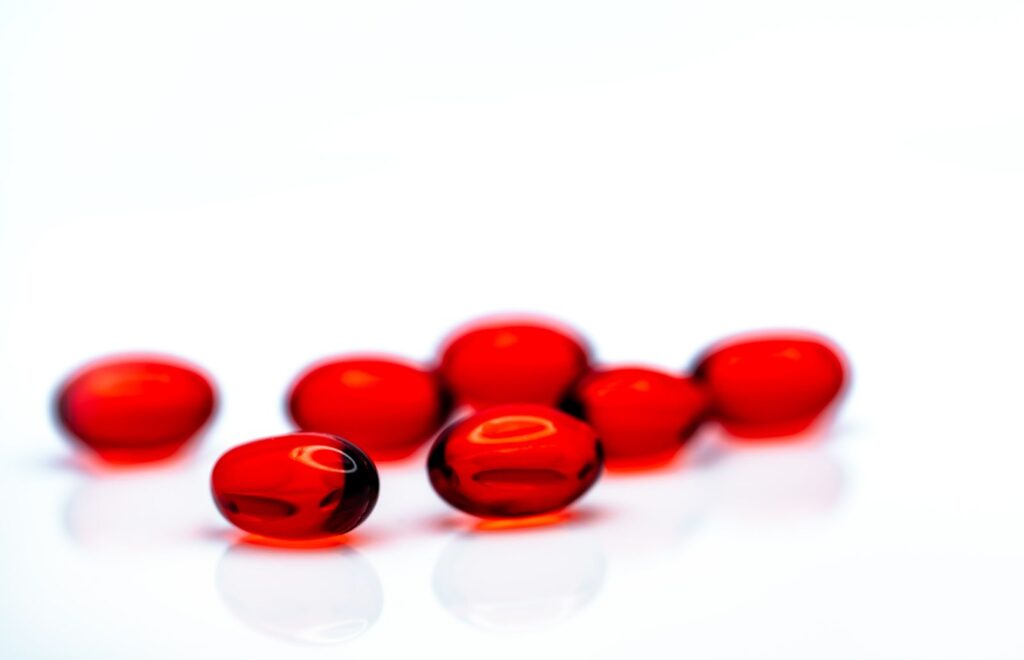
Chromium: Insulin Hero with a Secret
Chromium is a trace mineral that’s essential for our bodies. It acts as a key player in enhancing the effectiveness of insulin, the hormone that oversees the metabolism and storage of carbs, fats, and proteins.
Chromium is known to pack a punch in several ways. It holds the potential for improving insulin sensitivity, which can be a boon for people dealing with diabetes or prediabetes.
Clinical trials hint at Chromium’s role in managing your weight and curbing appetite: It might help keep those hunger pangs at bay. Further evidence suggests it can lower the risk of heart disease and improve cholesterol levels.
However, more research is needed to cement these findings.
While Chromium is generally well-received by your body, especially when we’re talking about food-sourced quantities, there could be a few hiccups if you’re going the supplement route.
For some people, higher doses may lead to side effects such as mood changes, headaches, dizziness, nausea, and yes, you’ve guessed it, insomnia.
It’s not fully clear how Chromium and sleep are entangled. Research indicates that it interacts with certain neurotransmitters and hormones that regulate sleep.
Insulin plays a crucial role in your circadian rhythm, the body’s internal clock that governs sleep-wake cycles. By influencing insulin levels, Chromium could potentially shift these rhythms, leading to sleep disturbances in some people.
Moreover, Chromium has a role in the metabolism of serotonin, a neurotransmitter that contributes to feelings of well-being and happiness. Serotonin is a precursor to melatonin, the sleep hormone. Changes in serotonin metabolism, therefore, could potentially affect melatonin production and disrupt sleep patterns.
But let’s bear in mind, we’re all unique, and what keeps one person awake might not affect another.
Multivitamins: Read the Fineprint
Multivitamin and Multimineral Supplements—the all-in-one solution for your nutrient needs, making sure your body’s got the backup it deserves. They are particularly useful if your diet is lacking certain nutrients.
But can a multivitamin cause insomnia as well?
Those seemingly harmless pills might be the culprits behind your sleepless nights. Just look at the vitamins that keep you awake at night that we discussed above. They could all be included in your multivitamin formula.
Let’s quickly explore the complex ties between multivitamins and sleep:
- Stimulating components: Some multivitamins carry elements like B vitamins that act as stimulants. These help in energy production and nervous system regulation. When taken in large doses or late in the day, they may overstimulate your system, complicating sleep initiation.
- Excessive minerals: Overconsumption of certain minerals in multivitamins can lead to disturbances. Copper, for example, when taken in excess, can cause conditions such as hyperactivity and restless leg syndrome, both disrupting sleep.
- Interactions with substances: Multivitamins may interact with substances like caffeine or certain medications, intensifying their effects and potentially impacting sleep. Also, multivitamins may interact with specific drugs (such as blood thinners), altering their efficacy or causing side effects that could affect sleep.
- Individual sensitivity: People react differently to multivitamins due to their unique genetic makeup, overall health, diet, and lifestyle. Some may experience an increased heart rate, surplus energy, or digestive issues, which could disrupt sleep.
Therefore, if you’re suffering from poor sleep and suspect your multivitamin may be the cause, try adjusting the timing of your dosage. Consult a healthcare provider to tailor the type and amount of multivitamins to your specific needs.
Picking out multiple single vitamins can be a smart move, as it lets you customize your supplement routine based on what your body specifically needs.

Does Vitamin C Keep You Awake? Immunity Boost vs Sleep Saboteur
Addressing the common notion, “Does vitamin C cause insomnia?” it’s important to note that scientific evidence doesn’t quite support this claim.
Let’s separate fact from fiction.
Some people hold the notion that vitamin C, or ascorbic acid, can prevent you from getting a good night’s rest. Modern scientific research, however, has not sufficiently substantiated this claim.
While high doses of vitamin C could slightly amplify the stimulating effects of dopamine, a neurotransmitter associated with excitement and mental alertness, it does not significantly disturb your sleep balance.
Many American studies have found no definitive correlation between the consumption of ascorbic acid and the ability to fall asleep. Moreover, Magnetic Resonance Imaging (MRI) tests have shown no differences in brain activity between those who have and have not consumed Vitamin C before bedtime.
Therefore, it’s time we put this misunderstanding to bed.
Contrary, an association was found between lower vitamin C intake and nonrestorative sleep, where individuals did not feel rested during the day, regardless of their total sleep hours.
A study revealed that individuals with insufficient levels of vitamin C in their bloodstream experienced more sleep disturbances and were more prone to sleep-related issues.
Currently, researchers are exploring whether taking vitamin C supplements can enhance sleep quality. Some studies conducted on cancer patients indicate that increasing vitamin C consumption may be beneficial for sleep health and could potentially improve symptoms of insomnia.
So, there’s no valid reason to avoid taking vitamin C in the evening. So, sleep soundly knowing that Vitamin C, an essential vitamin, brings numerous health benefits without the risk of sleep disruption.

Supplement Savvy: Dos and Don’ts for Optimal Usage
Whether you’re a seasoned supplement user or just starting to explore the world of dietary supplementation, it’s important to know how to use supplements safely and effectively. Here’s a list of dos and don’ts to guide you on this journey.
DOs:
- Do Consult Your Healthcare Provider: Before starting any supplement regimen, consult with a healthcare provider, especially if you have an existing health condition or are pregnant or breastfeeding. Your doctor can provide guidance on what supplements are safe and beneficial for you.
- Do Your Research: Not all supplements are created equal. Take the time to understand what you’re taking and why you’re taking it. Look for high-quality products from reputable brands.
- Do Follow Recommended Dosages: Each supplement comes with a recommended dosage for optimal benefits. Avoid the temptation to exceed these guidelines in the hopes of seeing faster or greater results.
- Do Pay Attention to Timing: Some supplements are best taken at certain times of the day. For instance, B vitamins, known for their energy-boosting effects, are generally recommended for morning use, while calming supplements like magnesium are often suggested for evening use.
- Do Check for Interactions: Some supplements can interact with medications or other supplements, altering their effects. Check with your healthcare provider or pharmacist to ensure your supplement regimen is safe.
DON’Ts:
- Don’t Expect Miracles: Supplements are meant to complement a balanced diet and healthy lifestyle, not replace them. Don’t rely solely on supplements to improve your health.
- Don’t Ignore Side Effects: If you notice any adverse reactions after starting a new supplement, stop taking it and consult your healthcare provider.
- Don’t Mix Supplements without Guidance: Mixing multiple supplements can lead to interactions or overdosing on certain nutrients. Always consult with a healthcare provider before taking multiple supplements.
- Don’t Substitute Supplements for Prescription Medication: Supplements can support overall health, but they should not replace prescription medications unless your healthcare provider advises otherwise.
- Don’t Overlook the Importance of a Balanced Diet: Even the best supplements can’t replace the benefits of a balanced diet. Aim to get most of your nutrients from whole foods and use supplements to fill in any gaps.
When it comes to supplements and sleep, it’s crucial to understand the potential impact they can have on your sleep cycle. Always remember to consider the timing of your supplement intake.
Another crucial point is to maintain consistency with your supplement regimen. Abruptly starting or stopping certain supplements can disrupt your sleep patterns. Gradually introduce new supplements into your routine and monitor their effects on your sleep.
Lastly, don’t underestimate the importance of a healthy sleep routine. Relying solely on supplements for a good night’s sleep might lead you down the wrong path. A balanced diet, regular exercise, and good sleep hygiene play crucial roles in achieving sound sleep.
The Verdict: Embrace Informed Choices, Not Sleepless Nights
Remarkable how supplements cause insomnia, transforming from health enhancers into stealthy thieves of sleep, don’t you think?
But don’t let this revelation steal your thunder. Instead, take it as a nudge to get to know these potent potions better.
Every supplement has a story to tell, a job to do, and sometimes a tiny plot twist.
The ever-vibrant red yeast rice, for example. While battling cholesterol, it might just pull an all-nighter on your sleep. Cellular dynamo CoQ10, that can transform into a nighttime nemesis, disrupting your dream hours. Or green tea extract, the detox darling with a surprising moonlight gig as a sleep swiper.
The point here is not to scare you away from supplements but to pay attention to the small print. What you ingest impacts your body, your sleep, your overall well-being.
So, don’t just pop pills, pop questions. And then make informed choices.

Key Points and FAQ
Do any supplements cause insomnia? And which vitamins cause insomnia?
Yes, certain supplements can cause sleeplessness, including those that contain high levels of B vitamins, iron, or stimulants like caffeine.
These vitamins and minerals may affect energy levels and the nervous system, which can disrupt sleep.
Remember, individual reactions can vary regarding the vitamins that may be causing insomnia or affecting your sleep.
What vitamins cause trouble staying asleep?

The very vitamins linked to difficulties falling asleep could equally contribute to problems maintaining sleep.
Particularly, supplements with energizing effects can lead to a state of increased alertness or energy that interferes with the sleep process. Therefore, make sure to manage your intake of these vitamins, especially near bedtime, to minimize potential sleep disruptions.
What are the best supplements for fall?
During the fall, supplements like Vitamin D and Omega-3 fatty acids can be beneficial as sunlight exposure decreases and seasonal mood shifts may occur.
Vitamin C, a potent antioxidant, plays a crucial role in supporting the immune system and has the potential to mitigate the severity and duration of colds and flu.
Additionally, zinc, an essential mineral, proves beneficial in fortifying the immune system and reducing the duration and severity of colds and respiratory infections.
A quality sleep supplement like melatonin might help you adjust to daylight savings time. These supplements can support overall health and sleep regulation.
What are the best vitamins to take at night?

A bedtime routine incorporating supplements such as magnesium, melatonin, and lavender can be a potent recipe for a restful night’s sleep.
As a calming mineral, magnesium helps relax tense muscles and soothe the nervous system, promoting a sense of tranquility before bedtime.
Melatonin, the hormone that regulates sleep-wake cycles, can be especially useful for those struggling with occasional sleeplessness or jet lag. Taking a melatonin supplement can gently signal to the body that it’s time to unwind and drift into a peaceful slumber.
The natural aroma and calming properties of lavender make it a popular herbal supplement for enhancing sleep quality. Whether in the form of essential oils or capsules, lavender can ease stress and create a serene environment conducive to a blissful night’s rest.
However, be aware that there are many other supplements that help or hinder your sleep, and their effects vary depending on individual factors.
What is the best amino acid for sleep?

When considering amino acids for sleep, two options are ideal: L-theanine and Glycine.
L-theanine, found naturally in green tea, is known for its ability to promote relaxation without causing drowsiness, making L-theanine for sleep an attractive option.
On the other hand, glycine plays a key role in the body’s sleep-wake cycle, and studies suggest that taking glycine before bed can improve sleep quality. Hence, using glycine for sleep may also be beneficial.
Ultimately, both L-theanine and glycine have their unique benefits, and the best choice can depend on your individual needs and responses.
Can vitamin C cause insomnia?

The belief that vitamin C can cause insomnia is a common misconception. In reality, there’s no scientific evidence to support the idea that taking vitamin C directly leads to sleep disturbances or insomnia.
Vitamin C is a vital nutrient that supports various bodily functions, including the immune system, and is generally safe for most people when taken in appropriate doses. As with any supplement, if you have concerns about its effects, including potential impact on sleep, it’s always best to consult a healthcare provider.
Do iron supplements cause insomnia?

Iron supplements have the potential to cause insomnia, despite their importance for bodily functions. Excessive iron intake, particularly in supplement form, can lead to restlessness and sleep disturbances. This is because elevated iron levels may disrupt the balance of neurotransmitters responsible for regulating sleep in the brain.
While iron is crucial for health, it’s essential to take supplements responsibly and under the guidance of a healthcare professional to avoid potential adverse effects on sleep.
Do calcium supplements cause insomnia?

Calcium supplements typically do not cause insomnia and are often taken in the evening to support bone health and facilitate sleep.
However, as with any supplement, excessive amounts or incorrect timing could potentially disrupt sleep.
Do collagen supplements cause insomnia?
Collagen supplements are not typically associated with causing insomnia. In fact, some evidence suggests collagen might even support sleep due to its glycine content. However, individual responses may vary, and it’s always wise to monitor any new supplement’s effects.
Do magnesium supplements cause insomnia?
Magnesium supplements are generally not linked to insomnia. On the contrary, magnesium often supports better sleep, as it aids in muscle relaxation and the regulation of certain neurotransmitters that induce sleep. It’s important, though, to take the recommended dosage to avoid potential side effects.
Do zinc supplements cause insomnia?

“Can zinc cause insomnia?” is a question that surfaces occasionally among those considering dietary supplements.
Generally speaking, zinc is not recognized as a direct cause of insomnia. In fact, this essential mineral plays a pivotal role in numerous bodily functions and is often incorporated into healthy sleep regimens.
That said, like any supplement, excessive intake of zinc may lead to unintended side effects, which could potentially include sleep disturbances among others. As a rule of thumb, adhering to the recommended daily dosage is vital to harnessing the health benefits of zinc without incurring adverse effects.
Can melatonin supplements cause insomnia?
Melatonin supplements are usually taken to promote sleep and are not generally associated with causing insomnia. However, taking too much melatonin or taking it at the wrong time of day can potentially disrupt the sleep-wake cycle, which could lead to sleep problems.
Can GABA supplements cause insomnia?

GABA supplements are typically used to promote relaxation and sleep. However, excessive or inappropriate use can potentially cause side effects, including disrupted sleep patterns. Therefore, it’s always best to stick to the recommended dosage and consult with a healthcare provider.
Can adrenal supplements cause insomnia?
Some adrenal supplements, particularly those containing stimulants like caffeine or herbs that stimulate the adrenal glands, can potentially cause insomnia. These supplements are designed to boost energy and alertness, which can disrupt sleep if taken too close to bedtime.
Can choline supplements cause insomnia?
Choline supplements are not typically associated with causing insomnia. However, as with any supplement, individual responses can vary. It’s always wise to monitor any new supplement’s effects and consult with a healthcare provider if sleep disturbances occur.
Can you take vitamin D3 at night?

It’s generally recommended to take Vitamin D3 in the morning, as taking it at night may interfere with sleep for some people. There have been some reports of vitamin D causing insomnia when taken in the evening. However, the effects can vary among individuals, so it’s best to experiment with timing or consult with a healthcare provider.
Can a lack of vitamins cause insomnia? And which vitamin deficiency causes sleeplessness?
Yes, deficiencies in certain vitamins, such as B vitamins, vitamin D, and magnesium, can contribute to sleep disturbances. For example, B vitamins play a crucial role in the production of serotonin, a neurotransmitter that regulates sleep. Therefore, identifying which vitamin deficiency causes sleeplessness is essential to managing sleep issues.
Can a B vitamin deficiency cause insomnia?
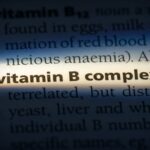
Yes, a deficiency in certain B vitamins, such as B6 and B12, can contribute to insomnia. These vitamins are essential for the synthesis of serotonin, a neurotransmitter that helps regulate the body’s sleep-wake cycle. Therefore, maintaining adequate levels of these vitamins is vital for healthy sleep patterns.
Can too much vitamin B12 cause insomnia?
Yes, too much vitamin B12 can cause insomnia in some individuals. Vitamin B12 is essential for energy production, and in excess amounts, it can potentially cause overstimulation and disrupt sleep. Hence, it’s always advisable to stick to the recommended dosage.
Can vitamin B complex keep you awake at night?
A B-complex vitamin supplement, which contains multiple B vitamins, can potentially cause sleep disturbances if taken too close to bedtime. B vitamins play a key role in energy production, which might interfere with sleep if their levels are excessively high.
Can mineral deficiencies cause insomnia?

Yes, deficiencies in certain minerals, such as magnesium, calcium, and iron, can contribute to insomnia. These minerals play key roles in supporting sleep and overall health. For example, magnesium aids in muscle relaxation and mood regulation, both of which can influence sleep quality.
Can niacin worsen sleep quality?
Niacin, also known as vitamin B3, can have varying effects on sleep quality. While regular doses are not likely to have much of a negative effect, in excess amounts, niacin can cause side effects like a flushing sensation, headaches, faintness, and insomnia, which can worsen sleep quality. Therefore, it’s advisable to take niacin for insomnia only under the guidance of a healthcare provider.
Can hair vitamins cause insomnia?
Hair vitamins are dietary supplements designed to enhance hair health with a blend of nutrients like biotin, vitamin C, vitamin D, iron, zinc, and folic acid. While beneficial for some, hair health is influenced by genetics, diet, and overall health.
However, some ingredients in hair vitamins, such as high doses of vitamin D and excess iron, can potentially cause insomnia or sleep disturbances in certain individuals.
Additionally, sensitivity to herbal extracts like ginseng may lead to sleep disruptions. Being mindful of dosage and consulting with a healthcare professional for sleep-related concerns is essential when using hair supplements.
Can prenatal vitamins cause insomnia?
Prenatal vitamins, containing nutrients like folic acid, iron, calcium, vitamin D, DHA, and iodine, are tailored to meet the health needs of pregnant women and their developing babies. The composition can differ among brands, making it essential to consult a healthcare provider for the best fit.
While some may question if prenatal vitamins cause insomnia, it’s typically not a reported side effect.
The higher levels of certain nutrients, like iron, might cause minor discomfort that could indirectly affect sleep. However, pregnancy-related factors such as hormonal changes or anxiety are more likely contributors to sleep disturbances. For any sleep concerns during pregnancy, it’s always best to consult a healthcare provider.
Can taking too many vitamins cause insomnia?
Taking too many vitamins or supplements can lead to insomnia or sleep disruptions. Excessive amounts of certain vitamins and minerals can interfere with the body’s natural sleep-wake cycle, causing difficulty falling or staying asleep.
For instance, high doses of vitamin D close to bedtime can disrupt the circadian rhythm, while excessive iron intake may lead to restlessness. B-complex vitamins, particularly B6, can stimulate the nervous system, potentially affecting sleep, and caffeine-containing supplements can interfere with sleep if taken too late in the day.
Additionally, some herbal supplements like ginseng or ginkgo biloba can have stimulating effects on the nervous system, leading to sleep disturbances when taken excessively.
What are some supplements for lack of sleep?
Several supplements can potentially help with sleep deficiency, including melatonin, magnesium, valerian root, lavender, chamomile, glycine, and L-Theanine.
Melatonin helps regulate sleep cycles, while magnesium and glycine might enhance deep sleep. Herbal remedies like valerian root and chamomile, as well as the scent of lavender, have been linked to improved sleep quality. L-Theanine, an amino acid found in green tea, promotes relaxation, facilitating sleep.
Despite the potential benefits, these supplements should be used in conjunction with good sleep hygiene and under the guidance of a healthcare provider.
Can green tea cause insomnia?
Yes, green tea can cause insomnia or sleep disturbances in some individuals, primarily due to its caffeine content. While green tea generally carries less caffeine than coffee, it still contains enough to potentially affect sleep, especially if consumed in large quantities or close to bedtime.
Caffeine is a stimulant that can increase alertness and interfere with the body’s ability to relax and fall asleep. Its effects can vary from person to person, with some individuals being more sensitive to caffeine than others. Additionally, individual tolerance levels to caffeine can change over time.
If you are sensitive to caffeine or notice that green tea affects your sleep, it’s best to consume it earlier in the day and limit your intake. Opting for caffeine-free herbal teas in the evening is a better choice for promoting restful sleep.
Should you take magnesium and calcium for sleep?
Magnesium and calcium can both support sleep. Magnesium aids in muscle relaxation, while calcium assists in the production of melatonin, a hormone that regulates sleep. Hence, these are typically included in the list of insomnia supplements. However, the timing and dosage should be guided by a healthcare provider.
What are some herbs that cause insomnia?

Certain herbs, particularly those with stimulant properties, can potentially cause insomnia. These include herbs like ginseng, guarana, and yerba mate, which are often found in energy drinks or supplements. Therefore, it’s advisable to check the ingredients in herbal supplements and monitor their effects on sleep.
Is it better to take vitamins at night or in the morning?
The timing of vitamin intake depends on the type of vitamin and its effects. For example, B vitamins, which are involved in energy production, are best taken in the morning, while magnesium, which aids in relaxation, can be taken at night.
Does taking vitamin D at night keep you awake?
Some people may experience sleep disturbances if they take vitamin D at night. Vitamin D is essential for various bodily functions, and taking it at night may interfere with the body’s natural sleep-wake cycle. Therefore, it’s generally recommended to take vitamin D supplements in the morning.
Do any supplements help for restless legs syndrome?
Restless Legs Syndrome (RLS) is a condition that may potentially be alleviated by certain supplements.
Iron can be beneficial if an iron deficiency is present, while magnesium may help due to its muscle-relaxing properties.
Low levels of Vitamin D and B12 have been linked to RLS symptoms, suggesting supplementation might be helpful.
Folate (Vitamin B9) and herbal supplement valerian root have also been reported to ease RLS symptoms.
However, effectiveness can vary, and any supplement regimen should be discussed with a healthcare provider.
L-lysine sleep aid: Does it work?
L-lysine, an essential amino acid, is sometimes used as a sleep aid. It can help reduce anxiety and improve sleep quality by influencing neurotransmitters that regulate sleep. However, its effectiveness can vary among individuals.
Fish oil omega fatty acid supplements: Can they cause insomnia?

While fish oil supplements are generally beneficial for health, they can potentially cause insomnia in some cases, particularly if taken in high doses. Some people also report experiencing vivid, distressing dreams, often referred to as fish oil nightmares. As with any supplement, it’s essential to monitor individual responses and consult with a healthcare provider for personalized advice.
What are “fish oil nightmares”?
“Fish oil nightmares” refer to vivid, sometimes distressing dreams reported by some people who take fish oil supplements.
While some studies have found that fish oil can enhance sleep quality, taking high doses may interfere with sleep and contribute to insomnia or nightmares. More research is needed to understand how large doses may affect sleep quality in the general population.
Can you take maca before bed?
It is generally recommended to avoid taking maca before bed, as it may have stimulating effects on some people due to its energizing properties. Maca is a natural adaptogen, which means it can help the body adapt to stress and increase energy levels. As a result, consuming maca too close to bedtime might interfere with your ability to fall asleep or stay asleep.
For those sensitive to stimulants or prone to sleep disturbances, it’s best to take Maca earlier in the day. Taking it during breakfast or lunchtime should allow enough time for any potential stimulating effects to wear off before bedtime. However, individual responses to maca can vary, so it’s essential to pay attention to how your body reacts and adjust the timing.
Are there connections between the effects of garlic, insomnia triggers, and sleep quality?

Garlic has many health benefits, but its potential effects on sleep are not well-studied. Some people may find that consuming garlic too close to bedtime could potentially trigger insomnia, likely due to its pungent aroma. Further research is needed to understand the exact connection between garlic, insomnia triggers, and sleep quality.
Are there other explanations for why a supplement could cause insomnia symptoms?
A supplement could cause insomnia symptoms due to several reasons. These could include the presence of stimulants, an excess of certain nutrients, or interactions with other medications or substances. Additionally, individual differences, such as genetics, diet, lifestyle, and overall health, can also affect how a person responds to a supplement.
What about vitamin K supplements? Can they cause insomnia?
Vitamin K supplements are generally safe, but their potential effects on sleep are not well-studied. It’s always advisable to consult with a healthcare provider for personalized advice before starting any new supplement regimen, particularly if you’re experiencing sleep disturbances.
What are the best sleep apnea vitamins?
While vitamin supplements don’t directly treat sleep apnea, certain ones may support overall health in those with this condition.
Vitamin D could potentially improve symptoms if a deficiency exists, and vitamin C and other antioxidants may help manage oxidative stress related to sleep apnea. B vitamins, especially B12, may help combat fatigue, a common symptom in sleep apnea patients. Magnesium could possibly enhance sleep quality, and omega-3 fatty acids may help reduce inflammation.
However, these supplements are not replacements for medical treatment, and all health and supplement plans should be discussed with a healthcare provider.

Sources
Office of Dietary Supplements – Vitamin B6. Nih.gov. Published 2023. Accessed July 24, 2023. https://ods.od.nih.gov/factsheets/VitaminB6-HealthProfessional/.
Lichstein KL, Payne KL, Soeffing JP, Heith Durrence H, Taylor DJ, Riedel BW, Bush AJ. Vitamins and sleep: an exploratory study. Sleep Med. 2007 Dec;9(1):27-32. doi: 10.1016/j.sleep.2006.12.009. Epub 2007 Sep 6. PMID: 17825610; PMCID: PMC2174691.
Bhaskar S, D Hemavathy, Prasad S. Prevalence of chronic insomnia in adult patients and its correlation with medical comorbidities. 2016;5(4):780-780. doi:https://doi.org/10.4103/2249-4863.201153.
Dehydroepiandrosterone Information | Mount Sinai – New York. Mount Sinai Health System. Published 2013. Accessed July 25, 2023. https://www.mountsinai.org/health-library/supplement/dehydroepiandrosterone.
DHEA. Mayo Clinic. Published 2021. Accessed July 25, 2023. https://www.mayoclinic.org/drugs-supplements-dhea/art-20364199.
Baker WL, Karan S, Kenny AM. Effect of dehydroepiandrosterone on muscle strength and physical function in older adults: a systematic review. J Am Geriatr Soc. 2011 Jun;59(6):997-1002. doi: 10.1111/j.1532-5415.2011.03410.x. Epub 2011 Jun 7. PMID: 21649617.
Bentley C, Hazeldine J, Greig C, Lord J, Foster M. Dehydroepiandrosterone: a potential therapeutic agent in the treatment and rehabilitation of the traumatically injured patient. Burns Trauma. 2019 Aug 2;7:26. doi: 10.1186/s41038-019-0158-z. PMID: 31388512; PMCID: PMC6676517.
Nicole, Sanborn AN. Better Quality Sleep Promotes Daytime Physical Activity in Patients with Chronic Pain? A Multilevel Analysis of the Within-Person Relationship. 2014;9(3):e92158-e92158. doi:https://doi.org/10.1371/journal.pone.0092158.
Office of Dietary Supplements – Dietary Supplements for Weight Loss. Nih.gov. Published 2013. Accessed July 25, 2023. https://ods.od.nih.gov/factsheets/WeightLoss-HealthProfessional/.
Hursel R, Viechtbauer W, Dulloo AG, Tremblay A, Tappy L, Rumpler W, Westerterp-Plantenga MS. The effects of catechin-rich teas and caffeine on energy expenditure and fat oxidation: a meta-analysis. Obes Rev. 2011 Jul.. doi: 10.1111/j.1467-789X.2011.00862.x. Epub 2011 Mar 2. PMID: 21366839.
Janssens PL, Hursel R, Martens EA, Westerterp-Plantenga MS. Acute effects of capsaicin on energy expenditure and fat oxidation in negative energy balance. PLoS One. 2013 Jul 2;8(7):e67786. doi: 10.1371/journal.pone.0067786. PMID: 23844093; PMCID: PMC3699483.
Paturel A. Sleep More, Weigh Less. WebMD. Published July 6, 2014. Accessed July 25, 2023. https://www.webmd.com/diet/sleep-and-weight-loss.
Cocoa: Overview, Uses, Side Effects, Precautions, Interactions, Dosing and Reviews. Webmd.com. Published 2013. Accessed July 25, 2023. https://www.webmd.com/vitamins/ai/ingredientmono-812/cocoa.
McCulloch M. Cacao vs Cocoa: What’s the Difference? Healthline. Published July 12, 2023. Accessed July 25, 2023. https://www.healthline.com/nutrition/cacao-vs-cocoa#terminology.
Cinquanta L, Di Cesare C, Manoni R, Piano A, Roberti P, Salvatori G. Mineral essential elements for nutrition in different chocolate products. Int J Food Sci Nutr. 2016 Nov;67(7):773-8. doi: 10.1080/09637486.2016.1199664. Epub 2016 Jun 26. PMID: 27346251.
Badrie N, Bekele F, Sikora E, Sikora M. Cocoa agronomy, quality, nutritional, and health aspects. Crit Rev Food Sci Nutr. 2015;55(5):620-59. doi: 10.1080/10408398.2012.669428. PMID: 24915358.
Nehlig A. The neuroprotective effects of cocoa flavanol and its influence on cognitive performance. Br J Clin Pharmacol. 2013 Mar;75(3):716-27. doi: 10.1111/j.1365-2125.2012.04378.x. PMID: 22775434; PMCID: PMC3575938.
Scholey A, Owen L. Effects of chocolate on cognitive function and mood: a systematic review. 2013;71(10):665-681. doi:https://doi.org/10.1111/nure.12065.
Garbarino S, Garbarino E, Lanteri P. Cyrcadian Rhythm, Mood, and Temporal Patterns of Eating Chocolate: A Scoping Review of Physiology, Findings, and Future Directions. Nutrients. 2022 Jul 28;14(15):3113. doi: 10.3390/nu14153113. PMID: 35956290; PMCID: PMC9370573.
ConsumerLab.com. I started taking red yeast rice and soon after developed insomnia. Could my red yeast rice supplement be the problem? ConsumerLab.com. Published February 10, 2016. Accessed July 25, 2023. https://www.consumerlab.com/answers/can-red-yeast-rice-cause-insomnia/red-yeast-rice-insomnia/.
EFSA Panel on Food Additives and Nutrient Sources added to Food (ANS); Younes M, Aggett P, Aguilar F, Crebelli R, Dusemund B, Filipič M, Frutos MJ, Galtier P, Gott D, Gundert-Remy U, Kuhnle GG, Lambré C, Leblanc JC, Lillegaard IT, Moldeus P, Mortensen A, Oskarsson A, Stankovic I, Waalkens-Berendsen I, Woutersen RA, Andrade RJ, Fortes C, Mosesso P, Restani P, Pizzo F, Smeraldi C, Wright M. Scientific opinion on the safety of monacolins in red yeast rice. EFSA J. 2018 Aug 3;16(8):e05368. doi: 10.2903/j.efsa.2018.5368. PMID: 32626016; PMCID: PMC7009499.
Richards L. What to know about red yeast rice and its health effects. Medicalnewstoday.com. Published April 11, 2022. Accessed July 25, 2023. https://www.medicalnewstoday.com/articles/red-yeast-rice#dosage.
Nguyen T, Karl M, Santini A. Red Yeast Rice. Foods. 2017 Mar 1;6(3):19. doi: 10.3390/foods6030019. PMID: 28257063; PMCID: PMC5368538.
Pepping J. Coenzyme Q10. Am J Health Syst Pharm. 1999 Mar 15;56(6):519-21. doi: 10.1093/ajhp/56.6.519. PMID: 10192685.
Spindler M, Beal MF, Henchcliffe C. Coenzyme Q10 effects in neurodegenerative disease. Neuropsychiatr Dis Treat. 2009;5:597-610. doi: 10.2147/ndt.s5212. Epub 2009 Nov 16. PMID: 19966907; PMCID: PMC2785862.
Does CoQ10 Cause Insomnia? Here’s What the Science Says. Snoozeuniversity.com. Published 2023. Accessed July 25, 2023. https://snoozeuniversity.com/does-coq10-cause-insomnia/.
CHROMIUM: Overview, Uses, Side Effects, Precautions, Interactions, Dosing and Reviews. Webmd.com. Published 2021. Accessed July 25, 2023. https://www.webmd.com/vitamins/ai/ingredientmono-932/chromium.
Brownley KA, Von Holle A, Hamer RM, La Via M, Bulik CM. A double-blind, randomized pilot trial of chromium picolinate for binge eating disorder: results of the Binge Eating and Chromium (BEACh) study. J Psychosom Res. 2013 Jul;75(1):36-42. doi: 10.1016/j.jpsychores.2013.03.092. Epub 2013 Apr 22. PMID: 23751236; PMCID: PMC4358897.
Havel PJ. A scientific review: the role of chromium in insulin resistance. Diabetes Educ. 2004;Suppl:2-14. PMID: 15208835.
Treating Depression With Chromium Supplements. Verywell Mind. Published 2022. Accessed July 25, 2023. https://www.verywellmind.com/chromium-for-depression.
Lothian J. Effect of Micronutrients on Insomnia in Adults: A Multiple-Baseline Study – Joanna Lothian, Neville M. Blampied, Julia J. Rucklidge, 2016. Clinical Psychological Science. Published 2016. Accessed July 25, 2023. https://journals.sagepub.com/doi/full/10.1177/2167702616631740.
Sim M, Hong S, Jung S, Kim JS, Goo YT, Chun WY, Shin DM. Vitamin C supplementation promotes mental vitality in healthy young adults: results from a cross-sectional analysis and a randomized, double-blind, placebo-controlled trial. Eur J Nutr. 2022 Feb;61(1):447-459. doi: 10.1007/s00394-021-02656-3. Epub 2021 Sep 2. PMID: 34476568; PMCID: PMC8783887.
Nowak D. Vitamin C in Human Health and Disease. Nutrients. 2021 May 11;13(5):1595. doi: 10.3390/nu13051595. PMID: 34064549; PMCID: PMC8150809.
Covarrubias-Pinto A, Acuña AI, Beltrán FA, Torres-Díaz L, Castro MA. Old Things New View: Ascorbic Acid Protects the Brain in Neurodegenerative Disorders. Int J Mol Sci. 2015 Nov 27;16(12):28194-217. doi: 10.3390/ijms161226095. PMID: 26633354; PMCID: PMC4691042.
Naderi A, de Oliveira EP, Ziegenfuss TN, Willems MT. Timing, Optimal Dose and Intake Duration of Dietary Supplements with Evidence-Based Use in Sports Nutrition. J Exerc Nutrition Biochem. 2016 Dec 31;20(4):1-12. doi: 10.20463/jenb.2016.0031. PMID: 28150472; PMCID: PMC5545206.
Kamangar F, Emadi A. Vitamin and mineral supplements: do we really need them? Int J Prev Med. 2012 Mar;3(3):221-6. PMID: 22448315; PMCID: PMC3309636.
Dwyer JT, Coates PM, Smith MJ. Dietary Supplements: Regulatory Challenges and Research Resources. Nutrients. 2018 Jan 4;10(1):41. doi: 10.3390/nu10010041. PMID: 29300341; PMCID: PMC5793269.
Dickinson A, Boyon N, Shao A. Physicians and nurses use and recommend dietary supplements: report of a survey. 2009;8(1). doi:https://doi.org/10.1186/1475-2891-8-29.
Agbabiaka TB, Spencer NH, Khanom S, Goodman C. Prevalence of drug-herb and drug-supplement interactions in older adults: a cross-sectional survey. Br J Gen Pract. 2018 Oct;68(675):e711-e717. doi: 10.3399/bjgp18X699101. PMID: 30249608; PMCID: PMC6145997.
Ronis MJJ, Pedersen KB, Watt J. Adverse Effects of Nutraceuticals and Dietary Supplements. Annu Rev Pharmacol Toxicol. 2018 Jan 6;58:583-601. doi: 10.1146/annurev-pharmtox-010617-052844. Epub 2017 Oct 6. PMID: 28992429; PMCID: PMC6380172.
Knapik JJ, Trone DW, Steelman R, Farina EK, Lieberman HR. Adverse Effects Associated with Multiple Categories of Dietary Supplements: The Military Dietary Supplement Use Study. 2022;122(10):1851-1863. doi:https://doi.org/10.1016/j.jand.2022.01.014.
Natural Doesn’t Necessarily Mean Safer, or Better. NCCIH. Published 2023. Accessed July 25, 2023. https://www.nccih.nih.gov/health/know-science/natural-doesnt-mean-better.
Cena H, Calder PC. Defining a Healthy Diet: Evidence for The Role of Contemporary Dietary Patterns in Health and Disease. Nutrients. 2020 Jan 27;12(2):334. doi: 10.3390/nu12020334. PMID: 32012681; PMCID: PMC7071223.
Naderi A, de Oliveira EP, Ziegenfuss TN, Willems MT. Timing, Optimal Dose and Intake Duration of Dietary Supplements with Evidence-Based Use in Sports Nutrition. J Exerc Nutrition Biochem. 2016 Dec 31;20(4):1-12. doi: 10.20463/jenb.2016.0031. PMID: 28150472; PMCID: PMC5545206.
Irish LA, Kline CE, Gunn HE, Buysse DJ, Hall MH. The role of sleep hygiene in promoting public health: A review of empirical evidence. Sleep Med Rev. 2015 Aug;22:23-36. doi: 10.1016/j.smrv.2014.10.001. Epub 2014 Oct 16. PMID: 25454674; PMCID: PMC4400203.
